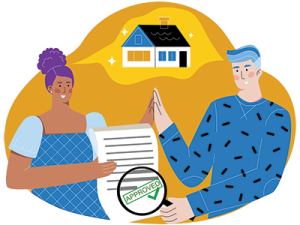What does a mortgage surveyor look for?
The mortgage valuation survey is a minimal appraisal of the current market value; the surveyor is only looking to see that the property is sufficient security for the loan, in case the lender is forced to repossess.
Fewer than 10% of UK homebuyers get a Level 2 survey or above, and those who trust the mortgage valuation alone often leave themselves facing costly surprises after they’ve moved in.
In this article, we’ll explain what a mortgage surveyor looks for, how the valuation differs from a RICS home survey, and why arranging your own independent survey is essential if you want real peace of mind.
What does a mortgage surveyor look for in a valuation?
When a mortgage surveyor visits you, they’re not giving the property a health check. Their role is to answer one question for the lender: if this borrower defaults, will the house sell for enough to cover the loan?
To get there, they’ll make a quick assessment of things that might devalue the property, like:
- Cracks in walls
- Visible damp patches
- Signs of subsidence
- Roof problems, walls and windows at a glance
- Concrete, or other non-standard construction
- The property’s size, age and type of build
- Trees near the property's foundation with large root structures
- Location and nearby concerns
- Sold prices of comparable local properties
- Other lender-specific dealbreakers, including minimum size, and certain conversions
Most valuation reports are only a couple of pages long; the buyer often never sees them. Even when they do, the detail is minimal and rarely gives any real insight into the property's condition.
The surveyor is there to protect the bank’s money, not to dig into every possible problem you might inherit as the new owner.
Here’s what a valuation won’t cover:
- Checking the roof for signs of leaks or missing tiles
- Looking at plumbing, drainage, or electrics in detail
- Assessing insulation, damp, or timber decay
- Reporting on potential legal issues, such as boundary disputes
- It may not include a physical inspection of the property at all
This gap leaves you, as a buyer, exposed. Imagine moving in and finding damp under the floors or discovering the wiring hasn’t been updated in 40 years. These are the kinds of risks a RICS survey is designed to highlight.
So while a mortgage valuation is unavoidable if you’re borrowing, it should never be treated as a substitute for your own survey. The small upfront cost of commissioning one could save you from much bigger bills later.
How is a mortgage valuation different from a RICS home survey?
The valuation asks: Is the house worth the loan amount for the lender? The survey asks: Is this property safe and sound for the buyer?
A mortgage valuation
A mortgage valuation is usually short and limited to 15-30 minutes, although some mortgage surveyors will look at a property for up to an hour or so. The surveyor checks the property’s general state, compares it with similar homes recently sold, and confirms whether the agreed sale price matches market value.
Sometimes, the valuer never steps inside and completes a 'drive-by' check, or a 'desktop valuation'. The findings go back to the lender, and you may only get a single line confirming the stated value, or simply confirming that the value given fell on or above the full value of the loan (not necessarily the full sale price, including your deposit).
RICS home survey
A home survey gives a thorough inspection. The surveyor spends far longer at the property, and they highlight visible issues and recommend further specialist investigations if there is evidence of larger problems.
The report is written in plain English, with traffic-light style ratings based on the urgency or severity of each defect. A level 3 home survey, which is recommended for older, larger, or unusual properties, will include a rough budget for any necessary repairs or restoration, ongoing maintenance, repair timeline, & the consequences of not acting.
For most buyers, the difference comes down to purpose: the bank wants reassurance about their security, while you need reassurance that the property is safe, and won't become a bottomless money-pit after you've got the keys.
Do buyers get to see the mortgage valuation report?
Usually not. The lender receives the mortgage valuation, but in many cases, the buyer never does.
Why buyers don’t always see the report:
- The valuation is commissioned by the lender, so the lender owns it
- It’s focused on confirming market value, not detailing condition
- Sharing it with the buyer doesn’t change the buyer’s legal position or protection
This can be a surprise if you were expecting more insight. There are exceptions; some lenders provide a copy automatically, while others may give you one if you ask. But even so, a market valuation is insufficient for your needs as the new owner.
Should you rely on a mortgage valuation alone?
No. A mortgage valuation is too limited to give you the reassurance you need as a buyer. It doesn’t tell you whether the house has problems that could cost thousands to put right.
What happens after your mortgage application is approved?
The next step is booking your own RICS home survey to get a clear sense of the property’s condition and defects, before exchanging contracts.
- National coverage with local RICS surveyors.
- Rated Excellent on Trustpilot.
- We handle the booking.
- Same week availability.
What if the valuation finds a problem?
If the valuer spots something serious that impacts value, the lender may ask for it to be fixed before releasing funds, or they may lend less.
If the problem is too big, you can save yourself the money of booking in your survey and pull out of the purchase. Or, if the problem is manageable, you can request that the seller either fix the problem, reduce the sale price to match the mortgage surveyor's valuation, or both.
How can you avoid a down valuation?
Pay close attention at the viewing for visible issues, and set your offer carefully, to ensure you're not over-offering more than the property is worth.
Factor in as much freely available information about the property as possible, such as flood risk maps and crime rate statistics.
If you're buying an unusual property, such as non-standard construction or a conversion, check the lender's basic criteria and avoid those with blanket rules excluding your type of home. Consult an independent mortgage broker who can advise you on which lenders or products are suitable before you apply.
Our brokers will present the best options available to you, for any type of mortgage, including:
- First-time buyers, home movers and buy-to-lets;
- Employed; self-employed or director mortages;
- Mortgages for non-UK residents or non-UK citizens;
- Bridging loans;
- Bad credit mortgages;
- Guarantor mortgages;
- Joint borrower, sole proprietor mortgages; and
- Absolute, Possessory, Good, or Qualified Title.
Caragh is an excellent writer and copy editor of books, news articles and editorials. She has written extensively for SAM for a variety of conveyancing, survey, property law and mortgage-related articles.
Andrew started his career in 2000 working within conveyancing solicitor firms and grew hands-on knowledge of a wide variety of conveyancing challenges and solutions. After helping in excess of 50,000 clients in his career, he uses all this experience within his article writing for SAM, mainstream media and his self published book How to Buy a House Without Killing Anyone.











